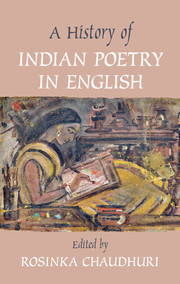Book contents
- Frontmatter
- Contents
- Contributors
- Acknowledgments
- Introduction
- SECTION I THE BROAD NINETEENTH CENTURY: INDIANS IN ENGLISH AND THE ENGLISH IN INDIA
- SECTION II PUBLISHERS, PUBLISHING HOUSES, AND THE PERIODICAL PRESS
- 9 “Zig Zag sublimity“: John Grant, the Tank School of Poetry, and the India Gazette (1822–1829)
- 10 “The Torch Not the Sceptre”: Writers Workshop, Calcutta
- 11 The Blue Rexine Archive: A Short History of Clearing House, a Poets’ Cooperative of the 1970s
- 12 “Melted Out of Circulation”: Little Magazines and Bombay Poetry in the 1960's and 1970's
- SECTION III POETRY: 1950–2000
- SECTION IV POETS OF THE DIASPORA
- SECTION V THE NEW MILLENNIUM POETS ON THEMSELVES
- Bibliography
- Index
10 - “The Torch Not the Sceptre”: Writers Workshop, Calcutta
from SECTION II - PUBLISHERS, PUBLISHING HOUSES, AND THE PERIODICAL PRESS
Published online by Cambridge University Press: 05 March 2016
- Frontmatter
- Contents
- Contributors
- Acknowledgments
- Introduction
- SECTION I THE BROAD NINETEENTH CENTURY: INDIANS IN ENGLISH AND THE ENGLISH IN INDIA
- SECTION II PUBLISHERS, PUBLISHING HOUSES, AND THE PERIODICAL PRESS
- 9 “Zig Zag sublimity“: John Grant, the Tank School of Poetry, and the India Gazette (1822–1829)
- 10 “The Torch Not the Sceptre”: Writers Workshop, Calcutta
- 11 The Blue Rexine Archive: A Short History of Clearing House, a Poets’ Cooperative of the 1970s
- 12 “Melted Out of Circulation”: Little Magazines and Bombay Poetry in the 1960's and 1970's
- SECTION III POETRY: 1950–2000
- SECTION IV POETS OF THE DIASPORA
- SECTION V THE NEW MILLENNIUM POETS ON THEMSELVES
- Bibliography
- Index
Summary
In 1987, the Institute of Book Publishing in New Delhi established the Indian Publishing Hall of Fame, “to acknowledge, acclaim and honour those who have made outstanding contributions to the promotion of publishing and the cause of book culture in India.” The inaugural list of inductees comprised, posthumously, Jawaharlal Nehru, K. M. Munshi (founder of Bharatiya Vidya Bhavan), D. R. Mankekar (who authored many books of political journalism), and M. N. Rao (promoter of the Home Library Plan, among other initiatives, in Andhra Pradesh); and Dev Raj Chawla (of UBS Publishers’ Distributors), the Sahitya Pravarthaka Cooperative Society (in Kerala), and P. Lal (of Writers Workshop). The citation for Professor Lal read: “Writers Workshop has grown into a movement with an ethos of its own. It has succeeded in furthering the cause of Indian poetry in English despite its limited resources: a tribute to Lal's devotion and energy. No one has been able to create and sustain a similar effort.” Yet, in 2008, when the planning started for an anthology marking fifty years of Writers Workshop, Lal shared with a researcher, “Fifty isn't enough for anyone to evaluate the Workshop. One needs to stand sufficiently distanced from history to assess.” Notwithstanding both the earlier encomium and his later warning, we attempt here to quantify Writers Workshop's contribution to Indian poetry in English, beyond the self-evident fact that in those fifty years it launched over 1,000 titles, most of them poetry in English by Indians, surpassing the combined output from all other publishers in that genre.
The Beginnings till the 1960s
P. Lal (born in 1929) made his first significant appearance in print as a college student in the third issue of the ninth volume of St Xavier's Magazine in July 1947, which contained his essay “In Defence of Modern English Poetry” along with a six-page poetry section edited by him.
- Type
- Chapter
- Information
- A History of Indian Poetry in English , pp. 162 - 175Publisher: Cambridge University PressPrint publication year: 2016



